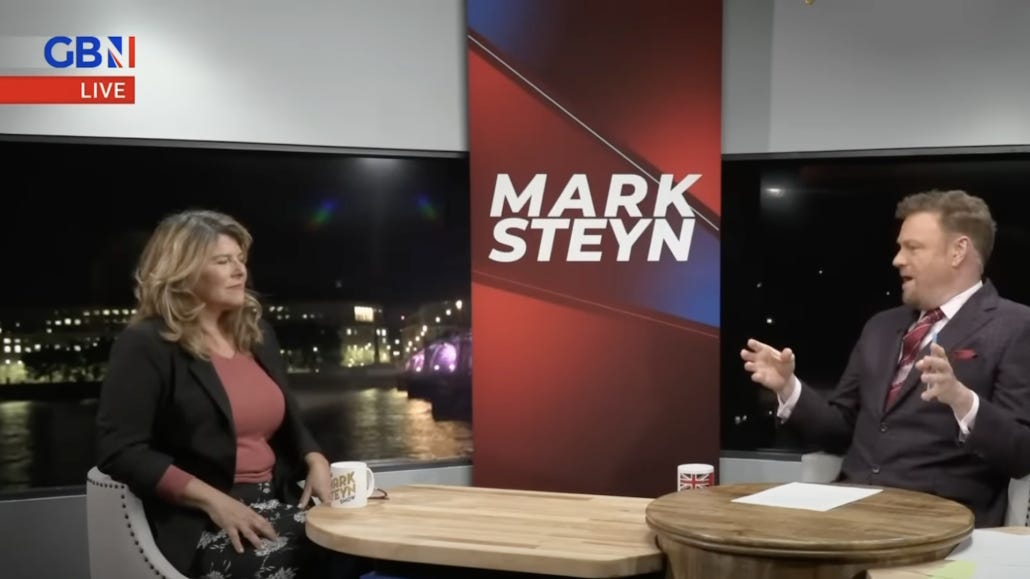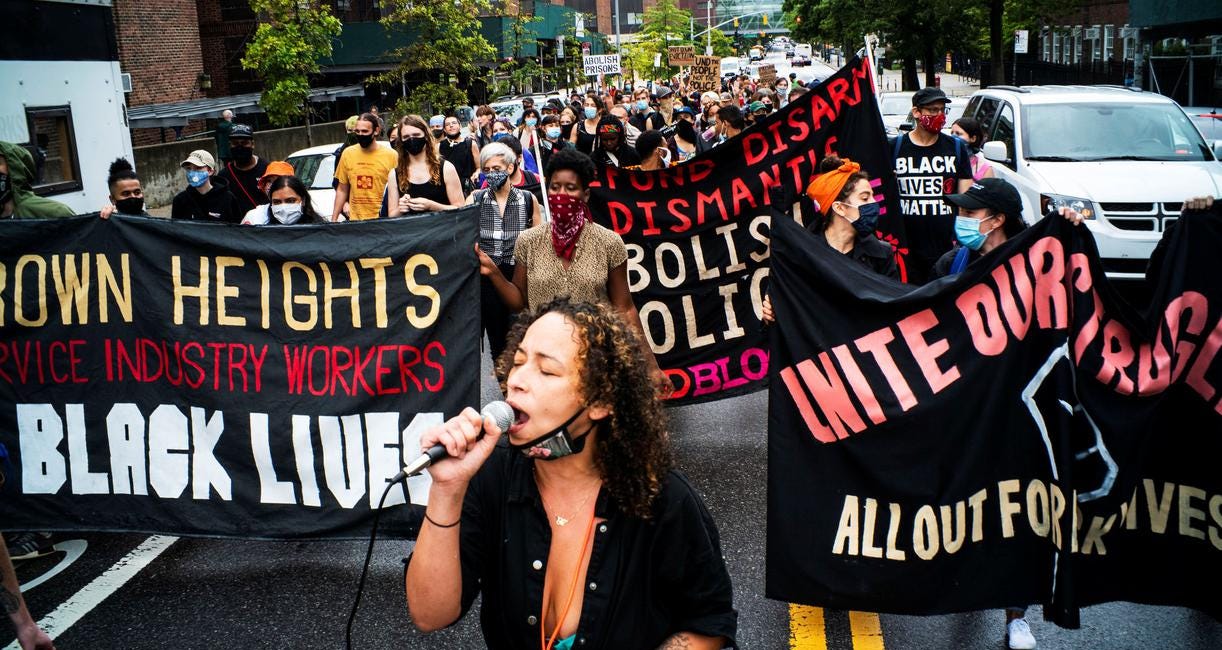GB News shows how money overrides democracy
Plutocrats and Putin have made a nonsense of broadcasting impartiality
Crackpot corner: Naomi Wolf and Mark Steyn on GB News
The weekend political column is for everyone to read. But please sign up as a free subscriber to receive more posts. Better still, help me carry on writing by becoming an actual paying subscriber. You will then receive access to all pieces, archives, and podcasts for a mere £1.15 a week. There is a free trial on offer too!
No one asked the British if they wanted propaganda on their TV networks, just as no one asked if they wanted pornography on their phones. Parliament never sanctioned it. The public never approved it. The arrival of British versions of Fox News happened because wealthy men ignored the law, and regulators were too weak and frightened to stop them.
Nothing better illustrates the power of money in the UK than the politicisation of Britain’s supposedly impartial broadcasting.
Those of us who remember the late 20th century look at GB News and Talk TV with amazement. It’s as if we woke up and found that the clocks had struck 13 o’clock and cars were driving on the right and the police officers were carrying guns. Politicised television was simply impossible to imagine in the UK. Legally it still should be. But the rule of law no longer applies in broadcasting.
I cannot emphasise strongly enough that the issue with GB News ought to be its very existence. The law specifically requires that news “must be reported with due accuracy and presented with due impartiality.”
Since the creation of the BBC in 1922, a defining characteristic of this country has been that broadcasters must provide, in the words of the BBC charter, high-quality news coverage “firmly based on British values of accuracy, impartiality, and fairness”.
Broadcasters often fail to live up to their ideals, as we all do. But the existence of the ideal brought benefits to British culture which the right is now deliberately destroying.
There is no way that the new and avowedly right-wing stations can promote “accuracy, impartiality, and fairness”. Just as in the 2010s there was no way that Vladimir Putin’s network RT (Russia Today) or the Iranian regime’s propaganda service Press TV would or could be impartial.
For all that, the UK’s broadcast regulators at Ofcom allowed first RT and Press TV and then GB News and Talk TV to operate in a country whose Broadcasting Code specifically banned propaganda.
David Davis the Conservative MP (and I should say an old friend) declared last week that “GB News gives a voice to a swathe of the population that has long been ignored by much of the rest of the press. Why do those seeking its closure have such a problem with that?”
Forget if you can, that much of the rest of the press is right-wing and occasionally far right wing, and consider that the law does not allow broadcasters to “give a voice” to anyone. They are there to report the news accurately and impartially.
We old timers therefore don’t just ask how deranged GB News presenters can get away with ranting, straight to camera, about “doomsday” Covid scientists accumulating dictatorial powers. Although it is a good question.
We don’t just ask how Mark Steyn, once a sharp Conservative commentator, who decayed into a conspiracy nut, and Naomi Wolf, who was always a conspiracy nut, can tell the viewers of GB News that the rollout of the Covid-19 vaccine was a premeditated “mass murder”. Although that is a good question.
We don’t even ask how a supposedly independent news channel can hire a pair of married Tory MPs as presenters and – get this – then assign them to interview the Conservative chancellor of the exchequer on bended knee as if the UK were a fetid one-party state. Although that is also a good question (and a fair comparison).
Speaking as GB News was forced to dispense with Laurence Fox, Dan Wotton and other extreme right presenters, David Yelland, a former editor of the Sun, described how right-wing channels, the right-wing press and the right-wing politicians they both employed were coalescing into a formidable bloc. He reminded us that Sir Paul Marshall, the co-owner of GB News, is preparing a bid to buy the Telegraph – and the need to appear respectable while the bid went ahead might explain why Marshall ditched Fox and other crazies this week.
If he succeeds, you will see an ominous consolidation of the British right into an American style political-entertainment complex.
Frightening though that prospect is, it still does not address the question of how could propaganda stations ever establish themselves in the UK first place.
The broadcasting regulators gave RT a licence, even though it covered up Russia’s crimes, and followed the lead of Putin’s intelligence services by promoting Brexit, Scottish nationalism, Corbynism and any other policy that might weaken the UK.
No one cared. Ofcom continued to treat it as if RT were the equivalent of the BBC and ITN. A brave reporter, Sara Firth, resigned over the fake stories RT told after pro-Russian forces shot down Malaysia Airlines Flight 17 in 2014. The Kremlin and its puppets in RT’s London office wanted her to lie about the slaughter of civilians and blame their deaths on Ukraine.
“It was the most shockingly obvious misinformation and it got to the point where I couldn’t defend it anymore,” Firth said at the time.
But the “shockingly obvious” misinformation did not shock Ofcom enough to push it into removing RT’s licence. When RT’s paymasters invaded Ukraine, it was the EU which took Putin’s propaganda stations off air not British regulators supposedly committed to enforcing due impartiality and upholding the standards of public-service broadcasting.
Paul Marshall, Rupert and Lachlan Murdoch and, indeed, Vladimir Putin might have campaigned openly to change the UK’s media law. There is a case for doing so. The codes governing broadcasting impartiality come from a time of spectrum scarcity. When it was only possible for a few channels to broadcast – there were just four in the 1980s – it made sense to insist on impartiality and neutrality. Since the arrival of cable TV and the net, the argument that running a TV station is a rare privilege which brought with it public service responsibilities has weakened.
A free-speech liberal or a conservative libertarian can now say that there is no technological reason why TV and radio stations should not be as biased, dumb, and cranky as the press, YouTube, or Twitter.
But even in the 2020s good reasons for defending broadcasting impartiality remain. The first is that running a TV station is a rapaciously expensive game to play, in which the fortunes of the Murdochs and the Marshalls have a distinct advantage, as does state backing from the Russian, Iranian and Chinese regimes.
A second reason to defend due impartiality is better to my mind and more elemental. This is how we do broadcast news in this country. It’s our tradition. It’s our culture, and has been since the 1920s, and as things stand it is the law.
The regulators will not enforce the law because they have been captured. They have been captured ideologically, as you can gather if you listen to Melanie Dawes, Ofcom’s chief executive, talk about the UK’s wonderfully “diverse” broadcasting. The poor thing seems to genuinely believe that Russian and right-wing propaganda is justifiable in the name of diversity. But my guess is that fear rather than diversity and inclusion is her main concern.
Ofcom’s fines are so pathetic no oligarch or dictatorial state need worry about them. When, that is, Ofcom can even be bothered to demand fines. After GB News issued vaccine misinformation that might have killed people, Ofcom imposed no sanctions but “arranged a meeting with GB News to discuss its approach to compliance". Christ but that must have had the leaders of the media right quaking in their boots.
But even if the regulators could pluck up the courage to enforce the law, they would run huge risks in the courts. Thirteen years (and counting) of Conservative rule has left a huge imbalance of force between regulators and wealth, whether in its corporate or hostile state form. Russia Today constantly threatened Ofcom with legal actions And every time it did, the regulators had to decide whether to risk the costs of fighting and losing a case in the English courts.
The intimidatory effect of outrageous legal costs is underacknowledged. Regulators in a diminished public sphere are up against opponents with the best and most unscrupulous lawyers and virtually unlimited funds. For regulators as for most UK citizens, the risks of losing a case are too great to contemplate.
The National Crime Agency, to quote one example, lost one third of its anti-corruption budget after it failed to enforce an “unexplained wealth order” against a Kazakh family living in London. A third of its budget gone because of just one case.
As I have said before, I cannot believe that Labour politicians with the spectacle of Fox News and Donald Trump before their eyes will allow GB News and Talk TV to carry on tearing up broadcasting law. Nor should they. The British right claims to be patriotic but it is threatening one of the strenghts of British culture. It is time for the left to stand up for what is best about Britain.
If you pay a mere £1.15 a week, you can subscribe to Writing from London. You will not only enjoy the glow of satisfaction that comes from the knowledge that you are allowing me to carry on working, but access to all kinds of exclusive work.
Recent pieces for subscribers inlude my long review of a serious and seriously impressive attempt to understand the failings of the woke movement.
The roots of wokeness
There are two dishonest conversations about wokeness, or identity politics if you prefer the less contentious term. The first from conservatives is wearily familiar. For some on the right “woke” is now a synonym for “anything I can’t abide”. Overuse has made the insult meaningless.
And one from the archives I really enjoyed writing on how Tory despair at Britain’s decline leads Conservatives to betray their country
Tinker Tailor Tory Traitor
Who is the author of this passage describing? He hated the EU very deeply, he said. For a while, he had remained content with Britain’s part in the world, till gradually it dawned on him just how trivial this was. In the historical mayhem of his own lifetime, he could point to no one occasion: simply he knew that if England were out of the game, the pric…
Keep reading with a 7-day free trial
Subscribe to Writing from London to keep reading this post and get 7 days of free access to the full post archives.






